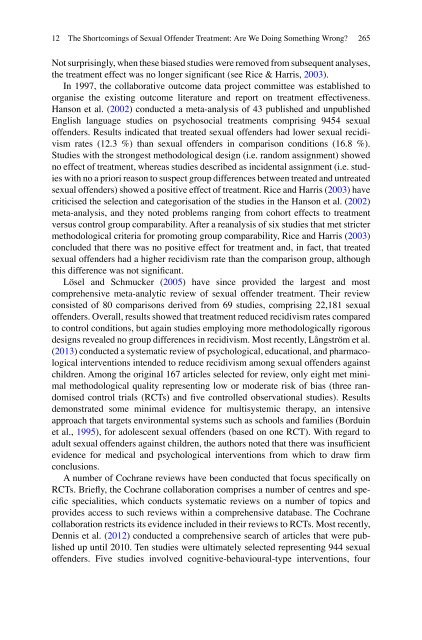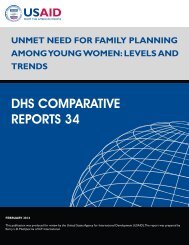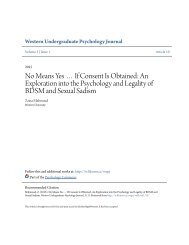Treatment of Sex Offenders
N0JsYq
N0JsYq
Create successful ePaper yourself
Turn your PDF publications into a flip-book with our unique Google optimized e-Paper software.
12 The Shortcomings <strong>of</strong> <strong>Sex</strong>ual Offender <strong>Treatment</strong>: Are We Doing Something Wrong?<br />
265<br />
Not surprisingly, when these biased studies were removed from subsequent analyses,<br />
the treatment effect was no longer significant (see Rice & Harris, 2003 ).<br />
In 1997, the collaborative outcome data project committee was established to<br />
organise the existing outcome literature and report on treatment effectiveness.<br />
Hanson et al. ( 2002 ) conducted a meta-analysis <strong>of</strong> 43 published and unpublished<br />
English language studies on psychosocial treatments comprising 9454 sexual<br />
<strong>of</strong>fenders. Results indicated that treated sexual <strong>of</strong>fenders had lower sexual recidivism<br />
rates (12.3 %) than sexual <strong>of</strong>fenders in comparison conditions (16.8 %).<br />
Studies with the strongest methodological design (i.e. random assignment) showed<br />
no effect <strong>of</strong> treatment, whereas studies described as incidental assignment (i.e. studies<br />
with no a priori reason to suspect group differences between treated and untreated<br />
sexual <strong>of</strong>fenders) showed a positive effect <strong>of</strong> treatment. Rice and Harris ( 2003 ) have<br />
criticised the selection and categorisation <strong>of</strong> the studies in the Hanson et al. ( 2002 )<br />
meta-analysis, and they noted problems ranging from cohort effects to treatment<br />
versus control group comparability. After a reanalysis <strong>of</strong> six studies that met stricter<br />
methodological criteria for promoting group comparability, Rice and Harris ( 2003 )<br />
concluded that there was no positive effect for treatment and, in fact, that treated<br />
sexual <strong>of</strong>fenders had a higher recidivism rate than the comparison group, although<br />
this difference was not significant.<br />
Lösel and Schmucker ( 2005 ) have since provided the largest and most<br />
comprehensive meta-analytic review <strong>of</strong> sexual <strong>of</strong>fender treatment. Their review<br />
consisted <strong>of</strong> 80 comparisons derived from 69 studies, comprising 22,181 sexual<br />
<strong>of</strong>fenders. Overall, results showed that treatment reduced recidivism rates compared<br />
to control conditions, but again studies employing more methodologically rigorous<br />
designs revealed no group differences in recidivism. Most recently, Långström et al.<br />
( 2013 ) conducted a systematic review <strong>of</strong> psychological, educational, and pharmacological<br />
interventions intended to reduce recidivism among sexual <strong>of</strong>fenders against<br />
children. Among the original 167 articles selected for review, only eight met minimal<br />
methodological quality representing low or moderate risk <strong>of</strong> bias (three randomised<br />
control trials (RCTs) and five controlled observational studies). Results<br />
demonstrated some minimal evidence for multisystemic therapy, an intensive<br />
approach that targets environmental systems such as schools and families (Borduin<br />
et al., 1995 ), for adolescent sexual <strong>of</strong>fenders (based on one RCT). With regard to<br />
adult sexual <strong>of</strong>fenders against children, the authors noted that there was insufficient<br />
evidence for medical and psychological interventions from which to draw firm<br />
conclusions.<br />
A number <strong>of</strong> Cochrane reviews have been conducted that focus specifically on<br />
RCTs. Briefly, the Cochrane collaboration comprises a number <strong>of</strong> centres and specific<br />
specialities, which conducts systematic reviews on a number <strong>of</strong> topics and<br />
provides access to such reviews within a comprehensive database. The Cochrane<br />
collaboration restricts its evidence included in their reviews to RCTs. Most recently,<br />
Dennis et al. ( 2012 ) conducted a comprehensive search <strong>of</strong> articles that were published<br />
up until 2010. Ten studies were ultimately selected representing 944 sexual<br />
<strong>of</strong>fenders. Five studies involved cognitive-behavioural-type interventions, four





